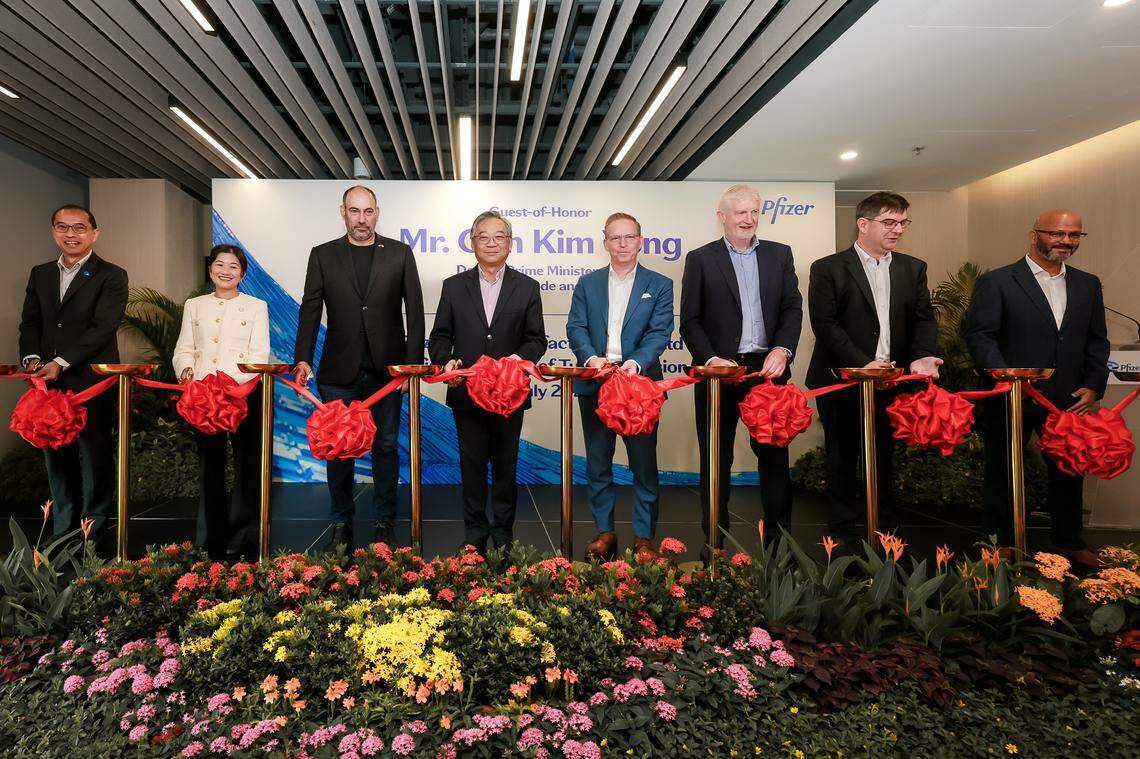US DRUGMAKER Pfizer on Tuesday (Jul 23) opened a S$1 billion extension in Tuas to produce active pharmaceutical ingredients (API) for its oncology, pain and antibiotic medicines.
Over 250 skilled jobs are set to be created by 2026 at the Tuas II facility that spans 429,000 square feet. So far, 230 roles have already been filled, with locals comprising about 80 per cent.
Pfizer’s site lead Paul Smullen said that the company is hiring across the board – including in production, quality and engineering – to fill the remaining roles.
The highly automated manufacturing facility is set to produce 11 types of API, seven of which are already being made at its first site. This includes an API used in one of its best-selling drugs – Ibrance – for breast cancer.
Production of the other four will be transferred to Singapore following an initial launch in Ringaskiddy, Ireland, said Smullen.
Paul Duffy, global supply senior vice-president of small molecules operations for Pfizer, said the company’s APIs are typically made in at least two different sites to ensure continuity of supply.
BT in your inbox
Start and end each day with the latest news stories and analyses delivered straight to your inbox.
The Tuas II facility has passed all necessary final performance qualification checks and begun commercial manufacturing of products, the company said.
It will supply markets across the world, including China, Brazil, Japan, Turkey, Europe and the US.

At the opening ceremony on Tuesday, Minister for Trade and Industry Gan Kim Yong said Pfizer is the largest contributor to Singapore’s pharmaceutical manufacturing output. He added that he is glad the company has chosen the city-state to grow its manufacturing network.
“We will strive to continue to be the choice location for pharmaceutical companies investing in leading-edge manufacturing technologies and facilities dedicated to new drug modalities,” he said.
This is in line with Singapore’s goal of becoming a global leader in advanced manufacturing under its Manufacturing 2030 vision, he added.
Jacqueline Poh, managing director from the Singapore Economic Development Board, said Pfizer’s investment reinforces Singapore’s standing as a leading biomedical sciences hub, and demonstrates how pharmaceutical giants can tap on the Republic’s talent and capabilities to manufacture therapies for the world.
“We look forward to deepening our longstanding partnership with Pfizer to create meaningful jobs and economic opportunities for Singapore,” she said.
At the same time, such investments will also facilitate and improve Singapore’s preparedness and resilience in dealing with future pandemics, said Gan, who is also deputy prime minister.
Gan, who was co-chair of the multi-ministry taskforce during the Covid-19 pandemic, said he wanted to acknowledge Pfizer’s close partnership with the government then.
Pfizer had “gone beyond contractual obligations” to accelerate vaccine deliveries at a critical time that enabled Singapore to raise vaccination rates rapidly, he said.
The pharmaceutical giant opened its first office in Singapore in 1964. In 2003, it established an API manufacturing plant in the city-state, as well as its regional headquarters overseeing emerging markets in Asia.
Singapore’s biopharmaceutical manufacturing sector produced more than S$19 billion of products for global markets in 2022, tripling from 20 years ago.
A key contributor to the Republic’s manufacturing output, the sector employs over 9,000 people, doubling from two decades ago.




